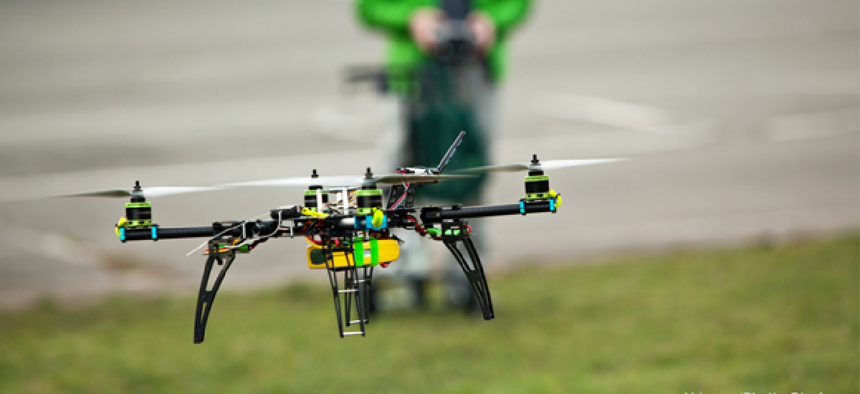Connecting state and local government leaders
Despite an FAA proposed rule to integrate unmanned aircraft into national airspace for commercial purposes, technology has not allowed for safe long-distance operation,
The Federal Aviation Administration delivered its much anticipated proposed rule for the use of unmanned aircraft – or drones – for commercial purposes in domestic airspace. Myriad advocacy groups and commercial industries have eagerly awaited the FAA’s proposed rules as the use of unmanned aerial systems (UAS) is expected to spark new businesses, promising billions of dollars in revenue.
While the FAA’s proposed rule is a step forward, it requires that drones weigh under 55 pounds and be flown in daylight within the line of sight of the operator without the use of visual aids such as binoculars. The agency cited two main safety concerns:
Collision avoidance – The UAS operator must be able to see manned aircraft in the air in time to prevent a mid-air collision between the small unmanned aircraft and another aircraft. The FAA said it believes “the equipment required to utilize these widely available technologies is currently too large and heavy to be used in small UAS operations.”
Loss of positive control – The UAS operator must be able to control the drone even if there was a failure of the control link between the aircraft and the operator’s control station. “A small unmanned aircraft whose flight is unable to be directly controlled could pose a significant risk to persons, property or other aircraft,” the FAA said.
While these safety concerns will keep drone delivery services from taking off any time soon, the sense and avoid technology the FAA is looking for has been maturing.
Sense and avoid technology has been deployed for some time on larger and smaller military drones. In fact, drone maker General Atomics Aeronautical Systems recently said it has flight-tested an early version of a sense-and-avoid radar mounted on its 10,000-pound military drone, Defense Systems reported. The systems are generally interoperable with traffic alert and collision avoidance systems (TCAS) used in most commercial aircraft, which alerts pilots when objects are approaching.
However, sense and avoid technologies on drones weighing less than 55 pounds is much less common. The semi-autonomous technology would allow drones to fly safely outside the line of sight of the operator. Some recent developments include:
Airware, creator of a hardware, software, and cloud services platform for commercial drone development and operation, is developing an Aerial Information Platform for the development and operation of UAVs. The company is working with NASA on a set of prototype air traffic management systems to test the limits of using low-altitude drones in commercial airspace.
The first prototype on the NASA project is an Internet-based system that would give drone operators information on oncoming obstacles, such as bad weather and physical obstructions, based on the flight plan filed. Eventually, more sophisticated feedback systems are envisioned that could actively manage the airspace by, for example, sending requests for groups of drones to spread out to avoid oncoming traffic.
Skydio, a drone start-up based in Menlo Park, Calif., has a prototype of an obstacle-avoidance system that relies on computer vision. It hopes to have it in users’ hands over the next 12 months, the Washington Post reported.
Meanwhile, researchers at the University of Denver’s Unmanned Systems Research Institute have developed a phased-array radar system that only weighs 12 ounces. The radar based system has advantages over transponder or camera systems, it’s developers said, because it works where there is poor visibility – at night or in bad weather. The technology was licensed in April to Integrated Robotics Imaging Systems in Kenai, Alaska, which will be testing it on its Infotron IT180, a French-made, dual-rotor unmanned platform.
The goal for the near term is to outfit smaller drones with artificial situational awareness, which might help to address safety concerns from the FAA. This could be especially true for government agencies as they will also be permitted to operate drones under the FAA’s proposed rule, though, with the same line of sight restriction.
Currently, safety is the name of the game for the FAA as it is projected that up to 7,500 unmanned aircraft could be introduced into U.S. airspace – already the most complicated, and safest, airspace in the world.



